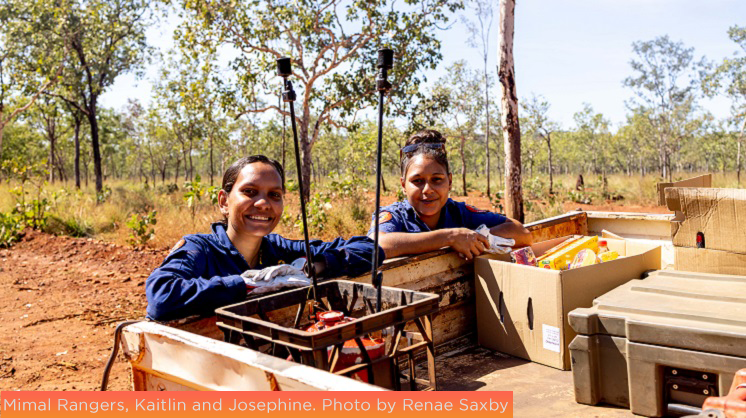
There are good ideas. And good ideas that have weighty names.
Putting responsibility for Aboriginal welfare in the hands of civil society organisations led by Aboriginal and Torres Strait Islander people is both. It’s just common sense for Aboriginal communities to have autonomy over how they work and live.
But the concept has interesting theoretical backing as well. It accords with the principle of subsidiarity - the idea that social problems should be solved at the level closest to the people affected and where they’re most likely to be fixed. That’s such a well understood part of social theory that it’s referenced in fields like politics and the military and used by institutions like the EU.
So let’s have a look at what it means in principle and practice.
There’s increasing understanding that Aboriginal Community Controlled Organisations (ACCOs) deliver better results for the communities they serve. But why?
Voices in the room, feet on the ground
The principal reason is that organisations led by Aboriginal people can see and understand the real issues at hand and have a very real and personal stake in them being solved.
Catherine Liddle is CEO at SNAICC (Secretariat of National Aboriginal and Islander Child Care), the peak national non-governmental body for Aboriginal and Torres Strait Islander children. She cites early childhood as an example.
For most Australian children the focus is on development in the early years of school – so that’s where the human capital and funding go. “Our children are different,” says Catherine. “Only 30% are on track at preschool so the targets used in non-Indigenous Australia kick in way too late.”
With over 40 years’ experience as a voice for Aboriginal children, SNAICC recently worked on a vexed policy area – helping Aboriginal families in Victoria manage issues around child protection[1] .Working with a coalition of Aboriginal bodies, social workers, policy experts and more, SNAICC helped drive changes to policies and processes that train social workers to manage issues of poverty and generational trauma.
"Our focus was making sure the family was in the room,” says Catherine. “All too often, decisions are made about families, not by families and are skewed to removing children.” This recent project fits into SNAICC’s overarching mission to ensure Aboriginal communities are the ones making decisions about the wellbeing of Aboriginal and Torres Strait Islander children.
According to Catherine Liddle, change is coming, but too slowly. And that’s where philanthropy comes in. “In some of the government programs we run, we have to report on 29 different budget lines,” she says. “But we have worked with philanthropists who are committed to supporting ACCOs and happy to invest in building our capacity and our ability to drive change, not tied to short-term outcomes. That’s a gift.”
Orphaned land
One other reason ACCOs can be more effective is that they draw on unique layers of knowledge – about culture, the land, social conditions and more. KKT (The Karrkad Kanjdji Trust) works in one of the most culturally rich and biodiverse regions of Australia: West and Central Arnhem Land. Its activities include protecting the land, supporting local communities, education and heritage protection.
Stacey Irving, KKT’s Chief Executive Officer says, “Arnhem Land was in danger of becoming orphaned Country – a land without its people. Our work puts Indigenous rangers – who live and work on Country – in charge of protecting biodiversity. They draw on millennia of Indigenous experience of the land – and the latest western science – to do that.”
KKT also run womens’ ranger programs that use their unique ecological knowledge around habitats and animal behaviour and respect their exclusive access to certain parts of the region.
With some philanthropic assistance, KKT developed primary school sites in Arnhem Land that deliver a bi-cultural education, with children learning outdoors, in small groups and spending time on Country with local rangers. The result is a high quality, culturally-aligned education and soaring attendance rates.
KKT Bininj (Indigenous) Chair, Dean Yibarbuk says the secret to KKT’s successes is harnessing the strengths of different stakeholders. “We’re combining intelligent philanthropy, good professional people – wherever they come from – and local expertise, using knowledge passed on over generations.”
How to help
To encourage funding towards projects that support Aboriginal and Torres Strait Islander communities, Perpetual reports on trends in this area in its annual IMPACT Philanthropy Application Program (IPAP) report. We also report specifically on philanthropic support of ACCOs.
In the 2021 financial year, over $1.9m of funding from Perpetual client’s was distributed through IPAP to support Aboriginal and/or Torres Strait Islander beneficiaries and over 50% of that funding went to ACCO organisations.
“The evidence says ACCOs have a big role to play in improving the lives of Aboriginal and Torres Strait Islander peoples,” says Emily Wellard-Baring, Senior Philanthropy & Non Profit Services Manager at Perpetual. “We also know that philanthropists can provide the kind of venture capital type funding that supports both innovation and investment in capability within those ACCOs. We’re doing whatever we can to bring those two powerful forces – Aboriginal led organisations and intelligent, generous philanthropy – together.”
[1] Catherine Liddle prefers to talk about “Child Care” given the fraught history of child removal in Australia.
